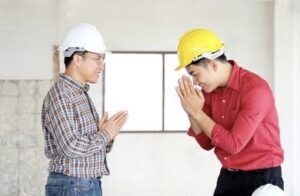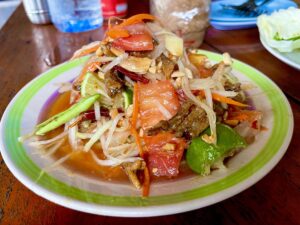By Josh Butterworth , Teacher in Phetchabun, Thailand
- Wai culture
Friends get a fist bump. Mum gets a hug. The lad behind the bar gets a thumbs up and someone you’ve got your eye on gets a wink, ensued instantly by regret and humiliation. On meeting your new boss, she gets a handshake, followed by a polite wave every time you pass her in the corridor. Whoever we are, wherever we’re from, we have unwritten rules of how to greet Tom, Dick or Harry depending on our relationship and their status. After fist bumping an interviewer you’re unlikely to get a call back, and the confusion on their face would match that on my friends if I were to greet them with a firm handshake. We learn the right way to greet different people in different situations throughout our life, and more often than not this keeps us in check wherever we go across the globe. But in Thailand, in might be wise to add another string to your bow of greetings. Why, you ask. Yes, wai.
Waiing is the act of placing your hands together as if praying, moving them up to your face so your forefingers lay gently on your nose, and nodding. It is an intrinsic part of Thai culture and history with roots in religion that go back a long time. Just like the plethora of greetings we use in our daily lives, waiing can take many forms in different situations and for different people. For example, when waiing the king you would be expected to put your back into it, whereas Sally from accounting barely gets a nod.
 The act of waiing is easy, to wai or not to wai, that is the difficult question. I have witnessed many a foreigner wai every Thai person they encounter, this is met with confused faces akin to the fist bumped interviewer and hand shaken friend, it’s simply not done. Overdoing it can lead to embarrassment and make people feel uncomfortable, because the rules of waiing relate to status, perceived or real, the rules are the rules. A student will wai their teacher but that teacher will not wai their student. That teacher will wai most of their colleagues, especially those who are older or more senior, and will be sure to give the school director an extra special wai. A shop assistant or restaurant worker may wai their customer, but that customer will not wai back. Put simply, it is necessary to greet those who are older or more senior than you with a wai, unless they are providing a service, your elderly neighbour and colleagues are good people to get started with. Not returning the wai of somebody providing a service can feel rude, but it’s totally normal and acceptable. In a similar vein, it would be perceived as rude and ignorant if one were to omit a wai when greeting somebody of higher status within the work environment, namely the school director.
The act of waiing is easy, to wai or not to wai, that is the difficult question. I have witnessed many a foreigner wai every Thai person they encounter, this is met with confused faces akin to the fist bumped interviewer and hand shaken friend, it’s simply not done. Overdoing it can lead to embarrassment and make people feel uncomfortable, because the rules of waiing relate to status, perceived or real, the rules are the rules. A student will wai their teacher but that teacher will not wai their student. That teacher will wai most of their colleagues, especially those who are older or more senior, and will be sure to give the school director an extra special wai. A shop assistant or restaurant worker may wai their customer, but that customer will not wai back. Put simply, it is necessary to greet those who are older or more senior than you with a wai, unless they are providing a service, your elderly neighbour and colleagues are good people to get started with. Not returning the wai of somebody providing a service can feel rude, but it’s totally normal and acceptable. In a similar vein, it would be perceived as rude and ignorant if one were to omit a wai when greeting somebody of higher status within the work environment, namely the school director.
Thais are taught to wai at a very young age. I’ve had grandmas gently put their baby’s hands together to wai me, so, unconsciously it’s imprinted in their mind. However, among rebellious youth, not waiing is an act of defiance and is viewed as somewhat embarrassing, a nod to history and the hierarchy of the past that they oppose and want to evolve from as a nation and people. At a cool, edgy bar full of 20 something year olds, greeting anyone with wai would be met with laughter, ensued instantly by regret and humiliation. To wai, or not to wai, that is the question.
- Opinions on monarchy and state
On arriving at Suvarnabhumi airport, Bangkok, no sleep, crap movies and disappointing food, you notice something striking as you rub your eyes and adjust to this new place. Framed in gold, standing above the large room as you wait for your luggage, the photograph of a man, and a separate photograph of a women watch over you. The king and queen of the richest monarchy in the world. As you leave the airport, there they are again. In the taxi to your hotel, over sky roads and through the hustle of the city, you lose count of how many times you see photo shrines to the monarchy and it’s king, each and every one clean and intact among the chaos of the city.
Fuelled by hotel coffee and street food you shake off the jet lag by setting out sightseeing, eventually making it to the Royal Grand Palace. It’s utterly beautiful and fit for a king, but, the king is nowhere to be seen. Rather than residing in the capital city of the country over which he rules, he prefers spending his days in the Bavarian forests of Germany, enjoying cycling and the company of young women. As the world saw during the large pro-democracy protests that took place in 2020 and 2021, predominantly in the capital, there is discontent among many people who want change.
In a country where many citizens live in poverty and have no choice other than to grind every single day of their whole lives, often well into their senior years, to do nothing more than put food on the table, there is bound to be trouble. Now I am no expert on this subject and am speaking as a somewhat ignorant outsider, but I have experienced many different aspects and opinions on this issue. Firstly, before coming to Thailand I was warned of the pedestal that the monarchy is on, warned not to step on cash to stop it blowing away because it bares the face of the king. I have witnessed the panic on many a shop keeper’s face after dropping a note, and the haste in which they run around the counter to pick it up. Many shops, restaurants, certainly schools and government buildings will have pictures of the king, not to mention the huge pictures on the side of the road and on bridges. On the surface, Thais love their king and the monarchy. However, things are not quite as they seem.
I have had several conversations with Thai people, mostly in their twenties and thirties, often fuelled by alcohol, who have told me openly about their disdain for the monarchy, the state and the police, who all uphold each other’s power. These people spoke of corruption, seedy behaviour and a general lack of care for the people they are supposed to be protecting and caring for. I don’t have any reason to believe that older people don’t also feel the same way, but maybe they are less able to express themselves due to a lifetime of conditioning, it’s on the youth to force change. It is actually illegal to defame, insult or threaten the king, punishable by many years in prison. So, if a Thai person opens up to you about their opinions on these issues, absolutely speak to them about it and you will have a fascinating conversation, but I do not recommend you being the one to bring it up in conversation, just to be safe.
- LGBTQ+ acceptance
 It’s been a good few years now since the school playground was my stomping ground. Being back as a teacher, it’s fascinating to see all of the dynamics among students, different cliques and plenty of characters who I can compare to kids that I shared the playground with. British or Thai, teenagers are teenagers. There is one group of students that I am thrilled to see fitting in and being accepted at school, because when I was a teenager I saw nobody like them, my only reference of LGBTQ+ people was from TV and films. When I moved to Manchester to go to university it was great to see gay couples walking down the street hand in hand, transgender people confidently going about their daily lives and nobody batting an eyelid. Like Manchester, Thailand is similarly accepting of LGBTQ+ people, at least on the surface.
It’s been a good few years now since the school playground was my stomping ground. Being back as a teacher, it’s fascinating to see all of the dynamics among students, different cliques and plenty of characters who I can compare to kids that I shared the playground with. British or Thai, teenagers are teenagers. There is one group of students that I am thrilled to see fitting in and being accepted at school, because when I was a teenager I saw nobody like them, my only reference of LGBTQ+ people was from TV and films. When I moved to Manchester to go to university it was great to see gay couples walking down the street hand in hand, transgender people confidently going about their daily lives and nobody batting an eyelid. Like Manchester, Thailand is similarly accepting of LGBTQ+ people, at least on the surface.
I am not part of the LGBTQ+ community so I cannot express the experience of somebody living here, but from the outside it seems like Thailand is further ahead than a lot of other countries in this part of the world, and some further afield. I was shocked and pleased to see many openly gay and transgender students in the school where I work, in my classes there did not seem to be any resentment and everyone is accepted. In places like Bangkok and other bigger cities, transgender and gay people do not need to hide, LGBTQ+ characters also feature in many TV shows and there was a transgender candidate for president a few years ago.
However, it’s not all golden. Currently, gay couples in Thailand still cannot be married. Despite on the surface there being a great acceptance of the LGBTQ+ community, it seems there is an undercurrent of prejudice, the attitudes of those who wrote the legislation in the 1970’s hasn’t yet been purged, in fact the law denying gay marriage was upheld only last year. It’s a great shame and a great contradiction that a country can be so accepting whilst simultaneously denying a large number of it’s citizens a basic right, all we can do is hope that the law is changed and keep supporting the LGBTQ+ community in any way we can.
- Bangkok focus
When choosing a city to live in the UK, London is not your only option. There are great places like Manchester, Birmingham, Newcastle and Leeds to name a few, where things happen. Things are different in Thailand. Bangkok, the worlds most visited city, is where power is concentrated. Of course, in no country is power divided completely equally, but in Thailand more than most, things begin and end in the capital. Bangkok is around 26 times larger than the second largest city in the country, this is crazy when London in only around 4 times bigger than Manchester. Almost every major institution including the top universities, banks, media and hospitals are concentrated in Bangkok, because it would not make sense for them to go anywhere else. Once the best and brightest come to Bangkok, more often than not they stay, due to the higher salaries and better opportunity.
I live in a small town called Phetchabun, about five hours north of Bangkok, it’s the biggest city in the province and it’s home. Surrounded by huge mountains and traditional agricultural farming, street food on every corner and friendly Thai people, it’s great. However, having lived there for five months, and travelling to different areas of the country, the focus on Bangkok is evident to me. I know that wherever you live is the centre of your universe, and people in Phetchabun may not even spare a thought about Bangkok, but it is noticeable. The brightest and the best go to Bangkok, this can leave other places devoid of energetic youth that really make a place what it is.
It is important to also state the benefits of not being in Bangkok, a city which is as busy, dirty, chaotic and noisy as it is beautiful and fun. Granted, it can be frustrating to not have some of the creature comforts that I am used in the UK, I love the cinema and going rock climbing, I love to go to football matches and a cheeky takeaway every now and then. In Bangkok it would be possible to satisfy all of these desires, not in Phetchabun. However, what being out of Bangkok does give you is a real authentic Thai way of life where you have to explore the culture and do things that Thai people do, eat things that Thai people eat, because the things that your used to probably won’t be available. It’s an adventure and I am grateful for it. Also, it’s calm, the pace of life is slower and it is possible to relax. Bangkok is a million miles an hour and most people living there jump at the chance to get out of the city and into the countryside for the weekend. Being out of Bangkok is healthier and you can enjoy the countryside, the weather, witness nature and farming. Then the excitement of going into the city for the weekend is kept alive and the intenseness of living there won’t drag you down.
- Contrast between tourist and local areas

In my opinion, there are three types of places in Thailand. There’s Bangkok, the rest of Thailand and the tourist areas. After five months in Phetchabun, only seeing the foreign teachers at our school and the odd foreign retiree pushing around a trolly in Tesco Lotus with his Thai wife, hitting the road and reaching Phuket to see scores of white bodies was a shock to say the least. Hearing English, Russian, French and every language under the sun was very strange. I can totally see why tourists flock here every year, it’s a beautiful country with wonderful weather, food, scenery, beaches, culture, history and people. However, it’s a culture shock leaving ‘real’ Thailand and going to a place catering to the needs of foreigners.
There are many different types of people who choose Thailand as their holiday destination. Families, travellers and unfortunately sex tourists, usually older white men who nurse pints of cheap lager in smoke filled bars, football playing on the TVs and awful music blaring out, always surrounded by young Thai women who have more make up on than clothes. It’s an element of Thailand I am not fond of, but you have to accept it for what it is. Deciding to meander down the walking street in Patong, Phuket, on a Saturday night, made me realise that the best thing to do is keep away from these areas. There are plenty of other places to go. Having people shove boards advertising Ping-Pong shows and cheep cocktail buckets every two seconds is intrusive and not what I, personally, am looking for. I will confess, these places are interesting and it’s a great way to see a certain part of humanity, but, it’s grim.
In Phetchabun you can bring a bottle of whisky to a bar and drink without extra charge, you can park almost everywhere for free, food is cheap and most of it is Thai. It’s a different story in tourist areas where it seems like everything is for sale and everyone is trying to squeeze every last baht out of the foreigners, and who can blame them. In ‘real’ Thailand you don’t feel the pressure to spend and it’s absolutely possible to do things on the cheap, even going out drinking or for a slap-up meal, it’s a lot more difficult to do this in places like Pattaya or Phuket so I advise having your wits about you and watching what you’re spending, if you find yourself there. Things may seem cheep compared to Europe and that can lead one to overspend, but compared to the rest of Thailand these tourist areas are extortionate and you end up paying for things that are usually free.
I must also caveat that although tourists can be annoying, especially certain types of them, I try to remind myself that they are just people who came to Thailand on holiday to enjoy themselves and forget about their 9-5 and real-life stresses. I have no right to judge them for this, having previously visited Thailand whilst travelling and now living here as a teacher, I try to remember the important Thai saying ‘mai pen rai’. Don’t worry. And, there are plenty of beautiful places you can explore which are less touristy, nowhere in Thailand is devoid or tourists but some places are quieter than others and I am confident that you will be able to find the right place for you.
Extras
- Pressure from waiters and shop assistants
On sitting down in a restaurant it is common for the server to hand you a menu then stand and wait until you are ready to order. This was disconcerting to me at first and can still get on my nerves. I prefer to take my time to look at the menu, especially if it’s in Thai and I need to translate it. The best thing to do in this situation is try and tell them to go, it can be difficult and they may not understand the concept, it’s just done differently here, but persist and use Google translate if needed. Also, shop assistants do a similar thing and often follow you around as you are browsing, it’s weird but awkward to try and tell them to leave, so go with it.
 Eating out often cheaper than cooking
Eating out often cheaper than cooking
Getting a takeaway or going out for food back in the UK, even something cheap, will set you back at least five pounds. Buying ingredients and cooking is what people normally do, it’s cheaper, not in Thailand. Ingredients at a supermarket like Tesco Lotus or Big C are not particularly expensive, but they’re not cheap either. Certain traditionally western ingredients tend to be pricey and you can end up with a big bill when you go to check out, it creeps up on you and things seem cheap so you pop them in the trolley. However, you can eat out at a cheap restaurant, street food stand or get a delivery from Food Panda for between one and two pounds, for a great meal that’s filling and authentic. So, often it’s actually cheaper to eat out unless you are cooking with just a few cheap ingredients. Also, most apartments and houses don’t have any kitchen equipment in them other than a fridge so you will likely have to buy that stuff.
- Street animals
It can be quite upsetting to see animals living on the street, dogs and cats, some in bad condition. People in Thailand, compared to other countries such as India, actually do care a lot for the animals, they often put out food and water for them at night. Also, people adopt street animals but do not let them in the house, so they are half street and half homed, a strange concept for westerners who usually treat pets like part of the family. What Thai people do not often do is take animals to the vets, so there can be some very poorly or injured animals around, which is tough. You can by all means help, but unless you are willing to adopt an animal, they will have to go back on the street once they have been to the vets. My girlfriend and I actually adopted a street puppy, he most definitely comes in the house and will come back to the UK with us. We also found a kitten on the middle of the road and took her to an animal shelter on Phuket, one of very few shelters in the country. She is incredibly cute so I’m sure she will be adopted soon.
Another thing to mention is aggressive dogs. When you move somewhere always ask the locals what the dogs are like and you may have to get a bamboo stick for when you go out walking, in the village where we live the dogs can be quite bad . I walk confidently towards them and wave the stick if they are barking, hitting it in the floor, it’s worked for me every time so far. On our travels we have had no issues with aggression towards us, but towards our dog, there has been plenty. Again, the best thing to do is be confident and stand your ground, don’t walk or run away, move towards them clapping and making noises but not making eye contact, and never get too close. Don’t be worried about it, it can be scary at first but you learn how to deal with them and get used to the ones where you live. 
Would you like to teach English in Thailand? Explore our program page or submit an application




